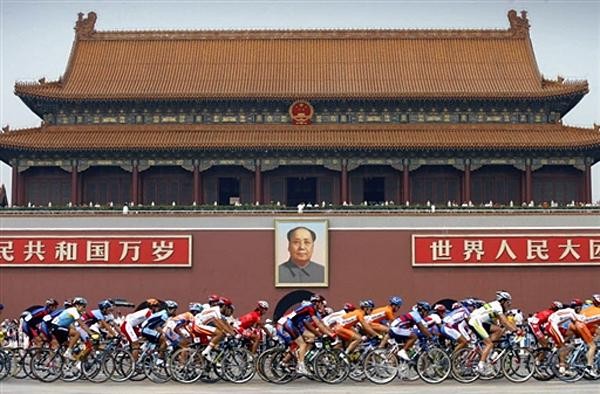Australians predict toughest-ever Olympic Games road race
After contesting the Beijing Test Event Saturday, Australians Cadel Evans and Michael Rogers said...

After contesting the Beijing Test Event Saturday, Australians Cadel Evans and Michael Rogers said the road course was harder than they had expected.
"It goes up, goes up some more and comes down then you go up again," said Evans after the race. "It's ten kilometres of climbing with some steep sections in it and not much recovery and then one big long downhill but even then it was a headwind all the way down and not so easy."
"It (the climb) was a little bit harder than I'd expected," said Rogers. "It's not super steep but it's quite constant and there is no actual recovery."
Rogers predicted the Olympians would have their work cut out for them in 2008. "Next year the field will be 100 percent better than today and I'm expecting a very, very tough race of attrition," said Rogers.
In the Olympics, racers will cover an additional three laps of the 23.8km circuit for a total distance of 245 kilometres. Saturday's four-lap, 174km event was won by Italian Gabriele Bosisio in 4:27:14.
The race began at Yongdingmen Gate at the southern end of Beijing's north-south central axis and travelled past several Beijing landmarks including the Temple of Heaven, Tiananmen Square, Yonghegong Palace, Temple of Earth Park and the Yuan Dynasty City Wall Relics Palace to the Juyongguan section of the Great Wall.
Evans finished fifth, 47 seconds down and Rogers was in 17th, 9'55" back. 34 of the 88 starters did not finish. Sunday's Stage 2 of the combined race continues with a 23.65 km individual time trial along the Juyongguan and Badaling Great Wall. Racers will contest one of the two total laps of the Olympic time trial. Event leader Bosisio has opted not to ride Sunday, which leaves Evans among the favourites for victory.
Get The Leadout Newsletter
The latest race content, interviews, features, reviews and expert buying guides, direct to your inbox!
Gathering intelligence
The Australian team's key aim this weekend is for riders and sports scientists from the Australian Institute of Sport to gather intelligence.
"We gained valuable information and we know for certain the course is for good mountain climbers but apart from that we'll sit down with the scientists who can hopefully put all the data into English and give us even more detailed information."
AIS Sports Scientists Dr Dave Martin and PhD student Laura Garvican were collecting a range of course profiling data as well as studying the way the riders coped with the different environment. The studies included sleep patterns, travel stress, hydration, lung function, body temperature, and power output.
In fact, despite predictions that the Beijing air quality would have a significant impact the, riders said it was the day's 70 percent humidity and 30 degrees Celsius temperature that really affected them.
"My lungs hurt to breathe but it's not the dirtiest place I've raced," said Evans. "Racing in an Italian city you get dirtier from diesel fumes but it's the humidity here that surprised me and the combination of pollution and humidity makes it a bit harder."
"Definitely quite heavy conditions but personally I had no problems with breathing," said Rogers. "I spend a fair bit of time near Milan so I'm used to riding with the pollution.
"It's also better here (at the finish line) than at the start when we had to ride through the city," he said. "We're about 60 kilometres out of the city here but it's still relatively humid and hot so it's tough conditions."
For complete coverage of the test event, click here.